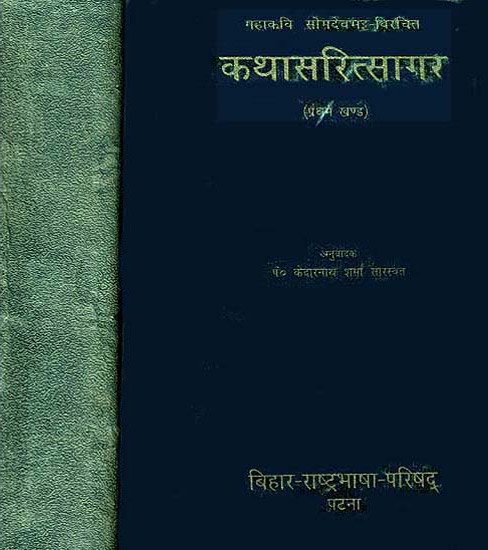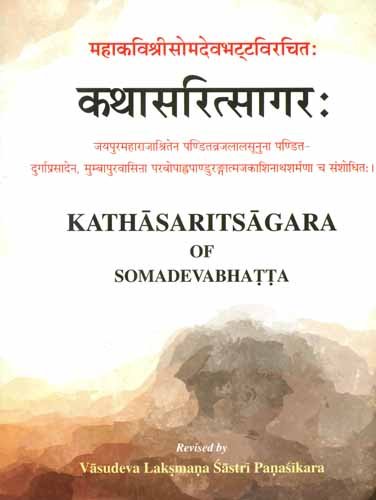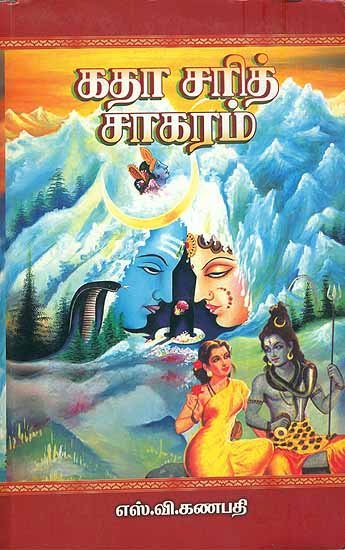Kathasaritsagara [sanskrit]
by C. H. Tawney | 2014 | 226,424 words | ISBN-13: 9789350501351
The Sanskrit edition of the Kathasaritsagara referencing the English translation and grammatical analysis. Written by Somadeva and dating from the 12th century, the Kathasaritsagara (or Katha-sarit-sagara) represents an epic legend narrating the adventures of Naravahanadatta as he strives to become the destined emperor of the Vidyadharas. Alternative titles: (Kathāsaritsāgara, कथासरित्सागर, Kathā-sarit-sāgara)
Verse 5.2.290
इत्य् उक्त्वा पितरौ च तौ प्रियतमां तां चात्मजां भूपतेः सद्यः शापतमोविमोक्षमुदितो विद्याविशेषैर् निजैः ।
तैस् तैः संव्यभजद् विचित्रचरितः सो ऽशोकदत्तस् तदा येनैते सपदि प्रबुद्धमनसो ऽजायन्त विद्याधराः ॥ २९० ॥
ity uktvā pitarau ca tau priyatamāṃ tāṃ cātmajāṃ bhūpateḥ sadyaḥ śāpatamovimokṣamudito vidyāviśeṣair nijaiḥ |
tais taiḥ saṃvyabhajad vicitracaritaḥ so 'śokadattas tadā yenaite sapadi prabuddhamanaso 'jāyanta vidyādharāḥ || 290 ||
The English translation of Kathasaritsagara Verse 5.2.290 is contained in the book The Ocean of Story by C.H. Tawney. This book is available online or you could buy the latest edition:
Read online Buy now! The English translation by C.H. Tawney (2014)
Glossary of Sanskrit terms
Note: This extracts Sanskrit terms and links to English definitions from the glossary, based on an experimental segmentation of verse (5.2.290). Some terms could be superfluous while some might not be mentioned. Click on the word to show English definitions.
Uktva, Pitri, Priyatama, Bhupati, Sadyah, Sadya, Sadyas, Shapa, Tama, Tamas, Vimoksha, Udita, Vidya, Avishesha, Nija, Tad, Vicitra, Carita, Sah, Ashokadatta, Tada, Yena, Yah, Yat, Sapadi, Prabuddha, Anas, Anasa, Vidyadhara,
Analysis of Sanskrit grammar
Note: this is an experimental feature and only shows the first possible analysis of the Sanskrit text (Kathasaritsagara Verse 5.2.290). If the system was successful in segmenting the sentence, you will see of which words it is made up of, generally consisting of Nouns, Pronouns, Verbs, Participles and Indeclinables. Click on the link to show all possible derivations of the word.
- Line 1: “ity uktvā pitarau ca tau priyatamāṃ tāṃ cātmajāṃ bhūpateḥ sadyaḥ śāpatamovimokṣamudito vidyāviśeṣair nijaiḥ ”
- Cannot analyse ity*uk
- uktvā -
-
uktvā (indeclinable)[indeclinable]√vac -> uktvā (absolutive)[absolutive from √vac]√vac -> uktvā (absolutive)[absolutive from √vac]
- pitarau -
-
pitṛ (noun, masculine)[nominative dual], [vocative dual], [accusative dual]
- ca -
-
ca (indeclinable conjunction)[indeclinable conjunction]ca (noun, masculine)[compound], [vocative single]ca (noun, neuter)[compound], [vocative single]
- tau -
-
ta (noun, masculine)[nominative dual], [vocative dual], [accusative dual]sa (noun, masculine)[nominative dual], [accusative dual]
- priyatamām -
-
priyatamā (noun, feminine)[accusative single]
- tām -
-
tā (noun, feminine)[accusative single]sā (noun, feminine)[accusative single]
- cāt -
-
ca (noun, masculine)[adverb], [ablative single]ca (noun, neuter)[adverb], [ablative single]
- ma -
-
ma (noun, masculine)[compound], [vocative single]ma (noun, neuter)[compound], [vocative single]
- jām -
-
jā (noun, feminine)[accusative single]
- bhūpateḥ -
-
bhūpati (noun, masculine)[ablative single], [genitive single]
- sadyaḥ -
-
sadyaḥ (indeclinable)[indeclinable]sadyas (noun, neuter)[compound], [adverb], [nominative single], [vocative single], [accusative single]sadya (noun, masculine)[nominative single]
- śāpa -
-
śāpa (noun, masculine)[compound], [vocative single]
- tamo -
-
tamas (noun, neuter)[compound], [nominative single], [vocative single], [accusative single]tama (noun, masculine)[nominative single]
- vimokṣam -
-
vimokṣa (noun, masculine)[adverb], [accusative single]vimokṣā (noun, feminine)[adverb]
- udito* -
-
udita (noun, masculine)[nominative single]√vad -> udita (participle, masculine)[nominative single from √vad class 1 verb]
- vidyā -
-
vidya (noun, neuter)[compound], [vocative single]√vid -> vidya (absolutive)[absolutive from √vid]√vid -> vidya (absolutive)[absolutive from √vid]√vid -> vidya (absolutive)[absolutive from √vid]vidyā (noun, feminine)[nominative single]
- aviśeṣair -
-
aviśeṣa (noun, masculine)[instrumental plural]aviśeṣa (noun, neuter)[instrumental plural]
- nijaiḥ -
-
nija (noun, masculine)[instrumental plural]nija (noun, neuter)[instrumental plural]
- Line 2: “tais taiḥ saṃvyabhajad vicitracaritaḥ so 'śokadattas tadā yenaite sapadi prabuddhamanaso 'jāyanta vidyādharāḥ ”
- tais -
-
ta (noun, masculine)[instrumental plural]ta (noun, neuter)[instrumental plural]tad (noun, neuter)[instrumental plural]sa (noun, masculine)[instrumental plural]
- taiḥ -
-
ta (noun, masculine)[instrumental plural]ta (noun, neuter)[instrumental plural]tad (noun, neuter)[instrumental plural]sa (noun, masculine)[instrumental plural]
- saṃvya -
-
saṃvi (Preverb)[Preverb]
- abhajad -
-
√bhaj (verb class 1)[imperfect active third single]
- vicitra -
-
vicitra (noun, masculine)[compound], [vocative single]vicitra (noun, neuter)[compound], [vocative single]
- caritaḥ -
-
carita (noun, masculine)[nominative single]
- so' -
-
saḥ (indeclinable correlative)[indeclinable correlative]so (noun, feminine)[compound]sa (noun, masculine)[nominative single]
- aśokadattas -
-
aśokadatta (noun, masculine)[nominative single]
- tadā* -
-
tadā (noun, feminine)[nominative plural], [vocative plural], [accusative plural]tada (noun, masculine)[nominative plural], [vocative plural]
- yenai -
-
yena (indeclinable)[indeclinable]ya (noun, masculine)[instrumental single]yaḥ (pronoun, masculine)[instrumental single]yat (pronoun, neuter)[instrumental single]
- aite -
-
- sapadi -
-
sapadi (indeclinable)[indeclinable]
- prabuddham -
-
prabuddha (noun, masculine)[adverb], [accusative single]prabuddha (noun, neuter)[adverb], [nominative single], [accusative single]prabuddhā (noun, feminine)[adverb]
- anaso' -
-
anas (noun, neuter)[ablative single], [genitive single]anasa (noun, masculine)[nominative single]√nas (verb class 1)[imperfect active second single]
- ajāyanta -
-
√jai (verb class 1)[imperfect middle third plural]√jan (verb class 4)[imperfect middle third plural]
- vidyādharāḥ -
-
vidyādhara (noun, masculine)[nominative plural], [vocative plural]vidyādharā (noun, feminine)[nominative plural], [vocative plural], [accusative plural]
Other editions:
Also see the following editions of the Sanskrit text or (alternative) English translations of the Kathasaritsagara Verse 5.2.290
Kathasaritsagar
by Kedarnath Sharma Saraswat (2005)
The Only Edition with the Sanskrit Text and its Hindi Translation (An Old and Rare Book) Set of 3 Vol.
Buy now!
Kathasaritsagara of Somadeva Bhatta (Sanskrit Text Only)
by Vasudeva Laksmana Sastri (2013)
Katha Sarit Sagar in Marathi
by H. A Bhave (1995)
Set of 5 Volumes; Published by Varada Books, Pune. 2256 pages (Throughout B/W Illustrations).
Buy now!
Katha Sarit Sagara (Tamil)
by S. V. Ganapati (எஸ். வி. கணபதி) (2014)
[கதா சரித் சாகரம்] Published by Alliance Publications.
Buy now!
Galpa Shono
by Abhijit Chattopadhyay (2014)
[গল্প শোনো] Galpa Shono: Bengali Translation of 'Suno Kahani From Katha Sarit Sagar'; 9788126015436; Published by Sahitya Akademi, Delhi.
Buy now!Preview of verse 5.2.290 in Bengali sript:
ইত্য্ উক্ত্বা পিতরৌ চ তৌ প্রিযতমাং তাং চাত্মজাং ভূপতেঃ সদ্যঃ শাপতমোবিমোক্ষমুদিতো বিদ্যাবিশেষৈর্ নিজৈঃ ।
তৈস্ তৈঃ সংব্যভজদ্ বিচিত্রচরিতঃ সো ঽশোকদত্তস্ তদা যেনৈতে সপদি প্রবুদ্ধমনসো ঽজাযন্ত বিদ্যাধরাঃ ॥ ২৯০ ॥
![Kathasaritsagara [sanskrit] - book cover](/uploads/a/Katha-Sarit-Sagara.jpg)




